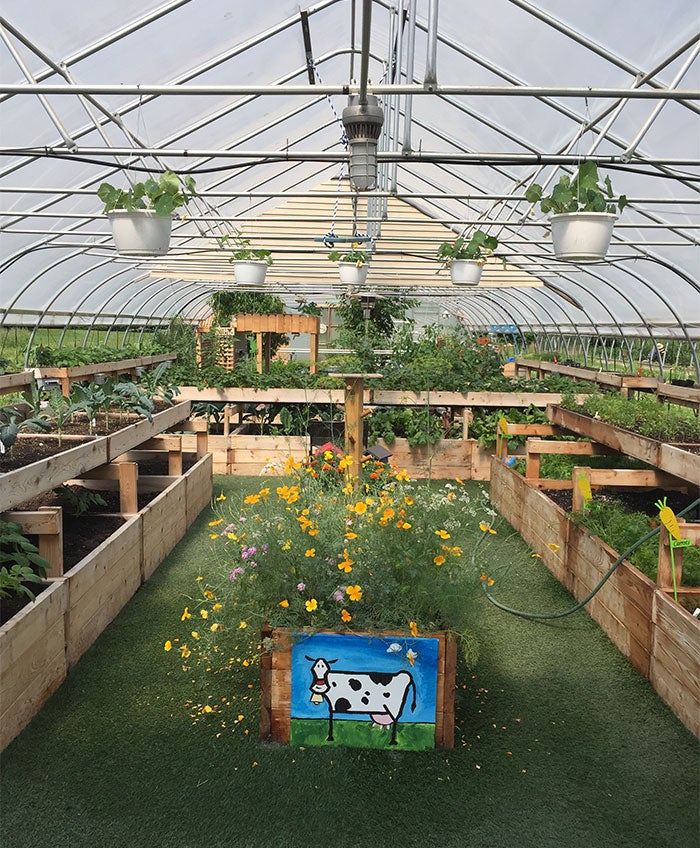St. Joseph Mercy Ann Arbor recognized for green initiatives

Pierre Gonyon, CHSP, system environmental safety and health leader, St. Joseph Mercy Ann Arbor, accepts a 2017 Michigan Green Healthcare Award with and Rob Casalou, regional president and CEO, Saint Joseph Mercy Health System.
The Michigan Health & Hospital Association (MHA) recognized St. Joseph Mercy Ann Arbor for its community-oriented sustainability efforts and commitment to reducing its environmental footprint.
St. Joseph Mercy Ann Arbor embarked on a campaign in 2003 to decrease its use of natural gas, electricity and water/sewer commodities both to benefit the environment and to cut costs that could be reallocated toward patient care.
Between 2004 and 2016, these combined efforts resulted in a 21 percent decrease in electricity consumption, 31 percent decrease in the use of natural gas and a 55 percent reduction in sewer/water use. In 2016, the hospital recycled more than 1.13 million pounds of materials, including paper, cardboard, plastics and metals.

The 25-acre farm has roughly 1.5 acres reserved for educational activities, therapy and for working and growing produce.
Pierre Gonyon, system environmental safety and health leader at St. Joseph Mercy Ann Arbor, and Rob Casalou, regional president and CEO of Saint Joseph Mercy Health System, accepted the Michigan Green Healthcare Award at MHA's Michigan Green Healthcare Conference Oct. 4 and 5 in Lansing, Mich.
"I'm very proud of our team at St. Joseph Mercy Ann Arbor for what they’ve accomplished in the area of environmental stewardship," Casalou says. "They’ve been a leader in this area for a long time, and this is recognition for an enormous amount of work done by many different people. We in health care need to impress sustainability as a core value and expand these practices and protocols, such as choosing to purchase green products across the region so that they become standard in terms of business operations."
St. Joseph Mercy Ann Arbor has a history of involvement in local environmental and sustainability issues that benefit and support the community and hospital.
Produce grown at The Farm at St. Joe's, which is part of the hospital’s 364-acre campus including nature trails, wooded areas and prairie, is sold at the hospital to local residents through a community-supported agriculture program.
A slice of the 25-acre farm is used to host educational activities on nutrition and also for an agritherapy program that helps disabled and emotionally challenged persons through gardening and other outdoor activities.
The hospital partners with a local farmer who has developed 23 acres of former grassland on the site to grow hay for use at his farm, which frees the hospital from the job of maintaining the parcel of land.
In addition, over a recent one-year period, The Farm hosted 1,071 students who participated in educational summer camps and field trips.
Other green initiatives include a community mercury thermometer exchange program in which the hospital safely disposes of local residents’ old mercury thermometers, and a Sharps Return program in which the hospital’s pharmacy accepts medical devices for safe disposal. St. Joseph also participates in the county Rx waste return program where community members can return old or unwanted medications to the hospital for safe disposal.
St. Joseph is an active member of several community groups that address environmental issues, including the county Solid Waste Planning Committee and the Waste Knot Program to reduce waste and increase recycling.
The hospital is a longtime member of the MHA-sponsored Michigan Hospitals for a Healthy Environment and the Michigan Green Healthcare Committee.
Saint Joseph Mercy Health System serves seven counties in southeast Michigan.




